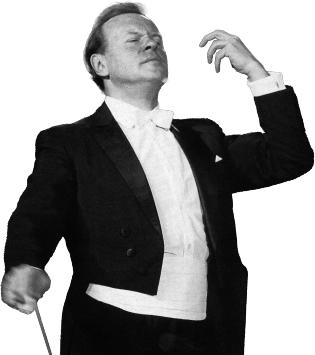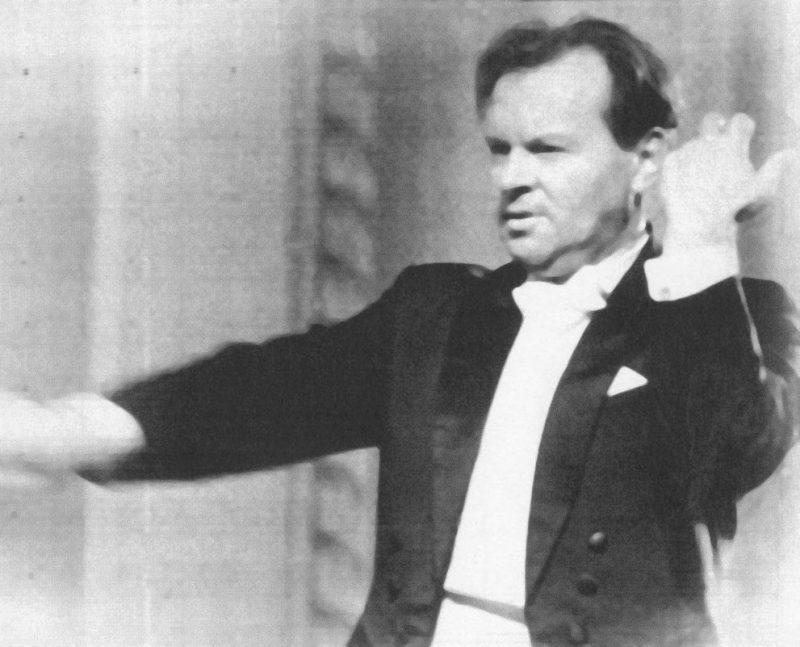Novosti Kulturi, Moscow
03 May 2012
On 3 May we remember the conductor, pianist, and composer Evgeny Svetlanov.
“Diamond conductor,” “the last romantic of the 20th century” — these are only a few of the rapt epithets bestowed on the musician.
“When you see him at the podium, you marvel at how he manages to penetrate to the very essence of the score, and deeper still — into the thoughts and feelings that gave rise to it,” —
Rodion Shchedrin, composer.
Evgeny Svetlanov was born on 6 September 1928. The son of Bolshoi Theatre artists, he spent his entire childhood backstage. At one rehearsal, the six-year-old boy, swept away by the music, jumped onto a chair and began waving his arms in time. Seeing this, Nikolai Golovanov made a prophetic remark: “He’ll probably be a conductor.”
The prediction happily came true.
“There is no world for me outside of music,” —
Evgeny Svetlanov
From the recollections of Evgeny Svetlanov:
“My life began in the Taganka district. My parents went off to perform at the Bolshoi Theatre. My father sang; my mother had stopped singing and was in the mime ensemble. As a boy I would stay with the nanny and wait for them long and painfully. I especially loved matinées. At the matinées they put on productions like Three Fat Men, and I knew that after “Three Fat Men” they would bring me balloons from the theatre, because there were so many there. Every artist received balloons after the performance.
After that they took me, put me on a tram, and brought me to the Bolshoi Theatre. It was The “Sleeping Beauty”. I remember very well how, during the interval, I ran up to the orchestra pit, grabbed the rail with my little hands, and began to peer into that pit from where those magical, truly enchanting sounds came. I saw there was no one. Individual musicians were warming up on their instruments, very strange and very different. Some were white, others black; some wooden, others brass. But most of all my attention was drawn, of course, to the huge tuba. Since then I’ve loved the tuba very much — I still do. It’s the foundation of any orchestra.
But the most important thing is the stage. That magic which flows from the stage into the auditorium!
In our communal flat there lived a violinist, Iosif Mikhailovich Belsky — a very good violinist from the Bolshoi. We often had conversations. Naturally, he looked down from above — I was still just a kid. He would say to me: “So you dream, Zhenya, of becoming a conductor; then remember this: the conductor is our personal class enemy.”
When we kids were playing in the yard, the great conductors heading off to the next performance would pass by — Shteinberg, Nebolsin, Golovanov. I thought to myself: “What happy people they are — going to the theatre to conduct a performance.”
My fate was bound up with the Bolshoi Theatre. I worked there as a supernumerary during the war; before the war I was in the children’s chorus. There was a competition for pianists for the orchestra, and I had just graduated from the Gnessin Institute — I needed to find a job somewhere. I was accepted, but I came into the orchestra as a conductor.
My first concert in this hall (the Great Hall of the Moscow Conservatory — ed.) was on 5 March 1953. At a concert of the student orchestra I conducted my own symphonic poem Daugava. It was the first performance of that work and, essentially, my conducting debut.
There were rather few people in the hall. We’d had few rehearsals, and near the end the orchestra under my hands began to drift and fall apart. Gradually it came to a halt, like a gramophone spring that no longer has the strength to keep the record turning. In the silent hush all I could say: “Rehearsal 40.” To start from there and finish the piece. That was my first concert in this hall.
Afterwards the late Ginzburg came up to me to console me. He said: “Zhenya, you know what? Don’t be upset.’”I must have looked as though I thought there would be no more music or conducting for me after this. It was a catastrophe — worse than a ship going to the bottom. He said: “Don’t be upset; this is a very good sign. If this happened to you at the very beginning of your path, it’s a guarantee that it won’t happen again for a very long time.”
I didn’t start conducting because I cultivated a conductor within myself. For me, conducting is a way to champion forgotten works, classical pieces — first and foremost Russian music, our classical Soviet music. Here I see a vast virgin field for a conductor’s work.
Very often we conductors think about ourselves — first of all, how to look impressive, how to put together a program to win loud, flashy success. There is another path. To bring to light music that hasn’t been heard for a long time, or has never been heard at all — that is already a kind of mission. You may be left without ovations, without success — but that’s not the point. The main thing is the purpose for which it is done. The music is remarkable; it must be heard; it must not remain on the shelves of dusty libraries.”
Evgeny Svetlanov was principal conductor at the Bolshoi Theatre, where, among others, he mounted productions of The Tsar’s Bride, The Enchantress, Otello, and The Golden Cockerel. He led the State Academic Symphony Orchestra of the USSR and headed musical ensembles in Sweden and other countries.
The maestro also left a rich creative legacy as a composer. He wrote numerous works, among them the symphonic poem Kalina Krasnaya (The Red Guelder-Rose), a Romantic Ballad, and chamber-instrumental pieces for piano, violin, and cello.
A People’s Artist of the USSR, Hero of Socialist Labor, laureate of USSR State Prizes, and holder of many orders and medals, Evgeny Svetlanov was the first Russian conductor counted among the Greats who worked at the famed La Scala.
“There is and can be no comparable figure equal in stature; Evgeny Fedorovich’s individuality was so vivid that certain works are unimaginable in any other performance,” —
Alexander Vedernikov, conductor
“In the end one must decide for oneself why a person lives. Every person lives for something, was born for something, and must do his work. No one will do that work for him. I defined that work for myself, in particular in creating an anthology of Russian music, in making records — in recording as such. I cannot help recalling Makarenko. The ideal remains almost as far off; there is still a great deal ahead.
I think humanity aspires to beauty and harmony naturally, and this striving will be eternal as long as human beings exist,” — said Svetlanov.
Evgeny Fedorovich Svetlanov passed away on 3 May 2002. He died at the age of 73, in his Moscow apartment, where he had returned between two concerts in London.
Source: Classical Music News, Moscow


